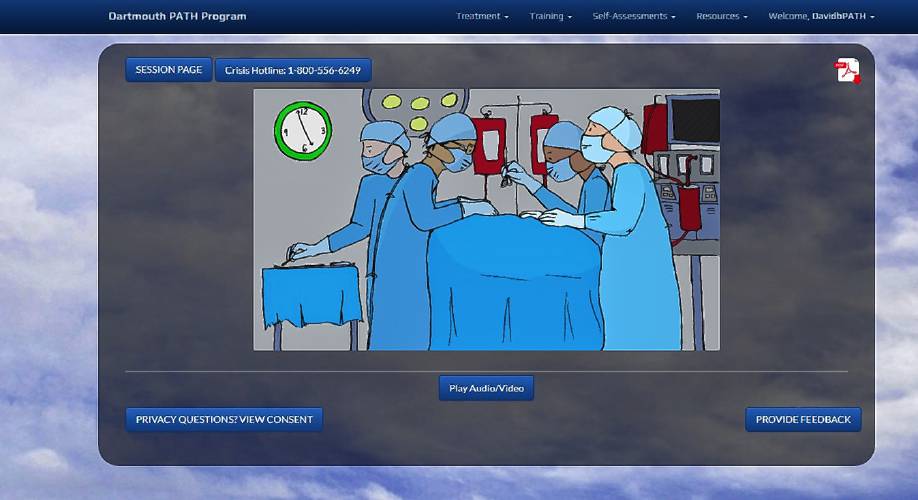From a personal-stress point of view, COVID-19 lockdowns are kind of like going to Mars, although the view isn’t quite as interesting.
We don’t have cosmic radiation or microgravity to concern us while living in small spaces for weeks at a time, but we do have plenty of uncertainty and fear about what happens next, not to mention endless interaction with housemates whether we want it or not.
So it seems appropriate that we might benefit from an online stress-management tool developed by an astronaut thinking about long-duration space flight.
“It’s not just the space program that has these problems,” said Dr. Jay Buckey, a professor of medicine at Dartmouth’s Geisel School of Medicine who as a NASA astronaut flew on a 16-day mission in Space Shuttle Columbia, and who has overseen development of the Dartmouth PATH Program.
Dartmouth PATH Program is a deep and involved series of interactive videos, quizzes and exercises, much of it based on cognitive behavioral therapy principals, designed to help us understand our feelings and reactions so we can control them when necessary.
“The goal is not to eliminate stress. In the short term it can be good; it alerts us. But chronic and ongoing stress is not good,” Buckey says in one video. “The goal is not to get rid of stress but to manage it.”
It can be found online at path.dartmouth.edu. You can sign up for free with an anonymous account, but you have to use your computer: There’s no mobile version.
The program has been online for a couple of years but hasn’t been publicized and is mostly used within the Dartmouth community. Recently, however, publicity including a story in the British national newspaper The Guardian has driven usage up – Buckey reported at least 1,500 new sign-ins when interviewed last week.
The site greets visitors with this message: “While not specifically developed for the social distancing and quarantine measures associated with COVID-19, this research resource demonstrates approaches to the stress, depression and conflict that can come with confinement.”
Since I’m not more immune to stress these days than you are, Dear Reader, I tried one of the sections, titled Mood. There was nothing startlingly new in it – the focus was on deep-breathing, a common part of any stress control program – but it included an interesting exercise to help you practice taking your mind off stressors.
It used a series of timed quizzes to take my mind off pandemics, climate change and the willful destruction of our functioning democracy. To be honest, it didn’t lessen my stress much but then I zipped through it and didn’t try very hard.
“It requires a little bit of time and effort on people’s part – learning something new, changing how you’re thinking about things or doing things,” said Buckey.
Much of the work building PATH has been overcoming our attention-deficit-disorder shortcomings. “We try to make it as engaging as possible,” he said – which explained multiple-choice questions like this one: “What’s the most common element in the universe: Oxygen, hydrogen, phosphorus, iPhones”.
This PATH Program has one great strength that is also a great drawback. You can take it completely anonymously, so you don’t have to worry that insights about your mental processes will end up for sale on a Reddit sub-forum.
But that anonymity means Buckey and others can’t use PATH for a research tool. They can’t correlate people’s results with their actions to compare the efficacy of different approaches. But then again, social science research often has this shortcoming: You can’t experiment with humans, and particularly not with our long-term emotions, the way you can experiment with lab rats.
Buckey thinks PATH can be valuable not as some sort of algorithmic cure but as a tool to help us handle stress, or help others help us.
“What I would like to see is it being used in collaboration with a therapist or nurse-practitioner, who can use this as a tool to assist in what they’re doing,” Buckey said.
Buckey’s space experience had its share of stress but he said a Mars mission would have much more stress and many different types. The flight to the Red Planet will take at least seven months and astronauts will have to live on the planet for at least a year before a return flight can happen. That’s a lot of confinement, which is why some feel the biggest concern about long spaceflight will be human personalities more than technical problems.
“How to live and work together in isolated environments for long periods – that’s something that everybody could probably be better at,” said Buckey.
Indeed it is. We just didn’t think we’d get so much practice at it.


 Return to the Concord Monitor
Return to the Concord Monitor